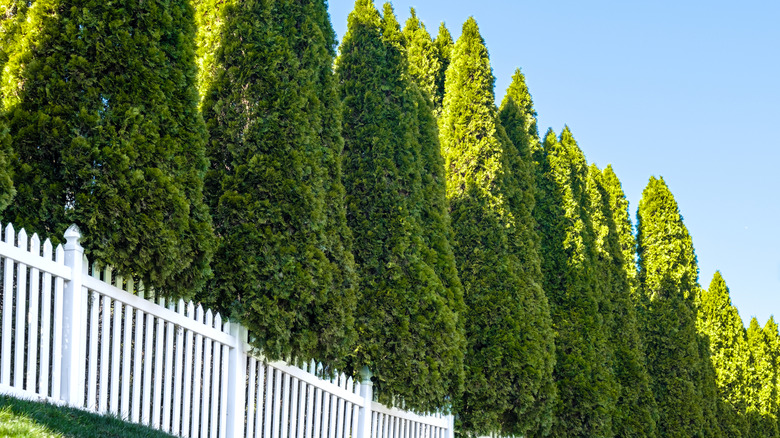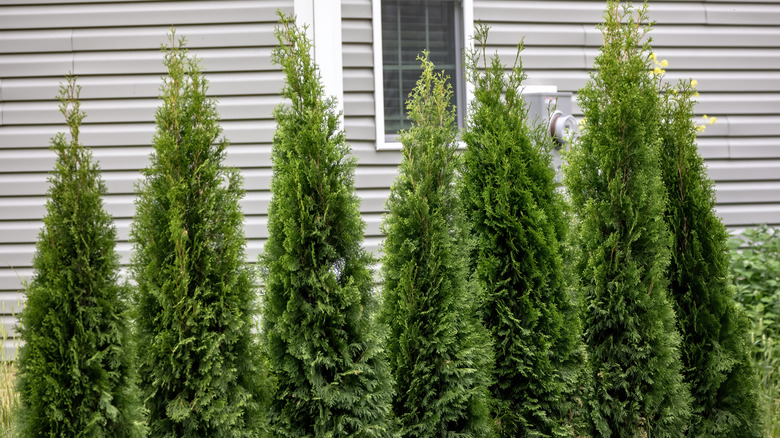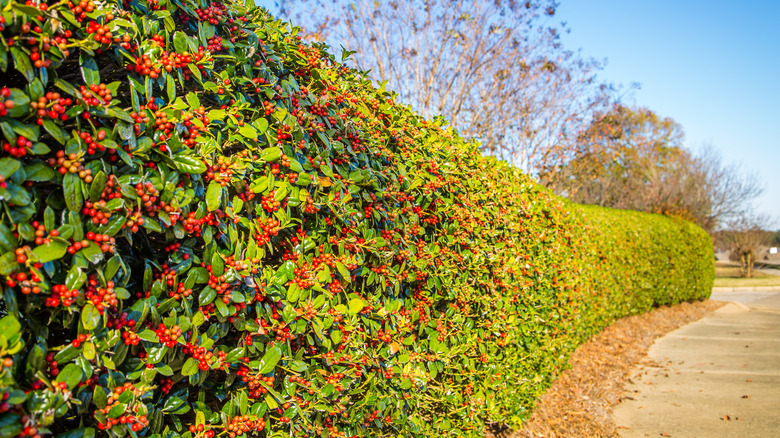Creative Plant Solutions For A Private Backyard Oasis
Living in a home surrounded by neighbors can feel like a fishbowl. Ever try to relax in a hammock while the neighbor's kid looks at you from his treehouse? Even if you have lovely people living next door, it's unsettling to think people are watching you, especially when you think you are alone. Fences are great for keeping pets from escaping and defining your property line, but they don't always provide enough privacy.
Shrubs and trees in your landscape can provide you with the privacy you crave. Wouldn't you rather look out your window and see lush greenery instead of your neighbor's unkempt yard? Or on the flip side, keep the neighbor with the perfect yard from judging yours? Unlike a tall fence, plants will make your backyard feel more like an oasis, and less like a prison. The added privacy will also add to your home's resale value.
The best plants for privacy are evergreen, providing cover even in winter. They are also fast growing, so you can start enjoying your private oasis as soon as possible. Juniper, cypress, holly, and bamboo are all excellent trees and shrubs that will cocoon your yard in a wall of privacy and look good while doing so.
For a privacy screen made from plants, these are the best options
'Spartan' juniper (Juniperus chinensis 'Spartan') is a popular tree used as privacy fencing for suburban homes. It's the perfect size for smaller yards, growing to a maximum height of 15 feet. 'Spartan' juniper is evergreen, fast growing, dense, and low maintenance, ticking many people's boxes. They can grow almost anywhere in the U.S. (USDA hardiness zones 4a to 9b) and tolerate heat, cold, and drought. Leyland cypress (x Cupressocyparis leylandii) is also a fast-growing evergreen and another fun choice for boundary lines, especially for parks and yards that have some acreage. These large trees grow up to 60 or 70 feet tall in USDA zones 6 to 10. Like juniper, it grows well in a variety of climates and soil conditions, and has a salt tolerance that allows it grow where many trees cannot.
American holly (Ilex opaca) is a tree or shrub found in USDA zones 5 to 9. This evergreen can grow 60 feet tall, but is often used in landscaping as a dense hedge kept to around 10 to 15 feet in height. Bamboo (Bambusa vulgaris) is an evergreen grass; however, it may lose leaves in extremely cold climates (most are evergreen down to USDA zone 7). There are two types of bamboo — clumping and running — but clumping is recommended since running varieties are invasive. Clumping bamboo grow to around 15 feet, with a growth rate of around 1 to 3 feet a year.
Using plants to create a private oasis in your own backyard
All of these plants will guard against prying eyes, but they are best used in different ways. 'Spartan' juniper is the most versatile choice. You can plant these trees in rows along boundary lines, or plant them next to a fence for added height. You can also strategically plant a few to conceal a window, back porch, or pool. Their mature width can be 4 to 6 feet, so plant them 6 feet apart. If you're aiming to go for a privacy screen, plant each tree in a double-staggered row.
Leland cypress make excellent boundary lines for larger yards. Due to their size, you only need one or two to block your hot tub or al fresco dining table. The dense foliage provides year-round cover and makes a great wind screen. If you're going for American holly as a beautiful privacy option in lieu of a fence, keep them box-shaped as a hedge as a solid screen for an outdoor room or fence line. Plant holly 5 feet apart, and they will quickly grow into a continuous hedge. You can also plant American holly as a tall tree (planted 25 feet apart), perfect for blocking your neighbor's view into your window.
Bamboo is regularly used to make a privacy fence taller when planted along a pre-existing structure. Plant 3 to 5 feet apart for 3-gallon sized plants, and 1 to 3 feet apart for 2-gallon plants. You should have a fully grown bamboo privacy screen in three years.


